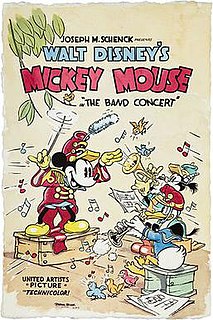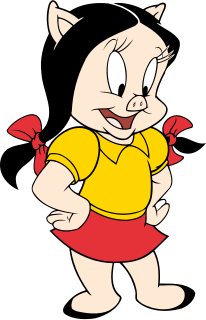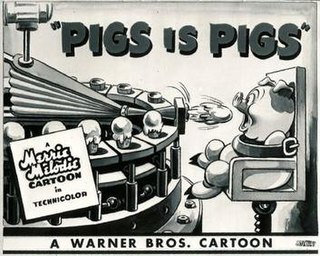
The Three Little Pigs is a fable about three pigs who build three houses of different materials. A Big Bad Wolf blows down the first two pigs' houses, made of straw and sticks respectively, but is unable to destroy the third pig's house, made of bricks. Printed versions date back to the 1840s, but the story itself is thought to be much older. The phrases used in the story, and the various morals drawn from it, have become embedded in Western culture. Many versions of The Three Little Pigs have been recreated or have been modified over the years, sometimes making the wolf a kind character. It is a type B124 folktale in the Aarne–Thompson classification system.

Looney Tunes is an American animated series of comedy short films produced by Warner Bros. from 1930 to 1969 during the golden age of American animation alongside its sister series Merrie Melodies. It was known for introducing Bugs Bunny, Daffy Duck, Porky Pig, Elmer Fudd, Tweety, Sylvester, Granny, Yosemite Sam, Foghorn Leghorn, Marvin the Martian, Pepé Le Pew, Speedy Gonzales, Tasmanian Devil, Road Runner, Wile E. Coyote and many other cartoon characters.

Porky Pig is an animated cartoon character in the Warner Bros. Looney Tunes and Merrie Melodies series of cartoons. He was the first character created by the studio to draw audiences based on his star power, and the animators created many critically acclaimed shorts featuring the character. Even after he was supplanted by later characters, Porky continued to be popular with moviegoers and, more importantly, the Warners directors, who recast him in numerous everyman and sidekick roles.

The Wise Little Hen is a Walt Disney's Silly Symphonies cartoon, based on the fairy tale The Little Red Hen. This cartoon marked the debut of Donald Duck, dancing to the Sailor's Hornpipe. Donald and his friend Peter Pig try to avoid work by faking stomach aches until Mrs. Hen teaches them the value of labor. This cartoon was released on June 9, 1934. It was animated by Art Babbitt, Dick Huemer, Clyde Geronimi, Louie Schmitt, and Frenchy de Tremaudan and directed by Wilfred Jackson. It was also adapted as a Sunday comic strip by Ted Osborne and Al Taliaferro.

Silly Symphony is a series of 75 animated short films produced by Walt Disney Productions from 1929 to 1939. As their name implies, the Silly Symphonies were originally intended as whimsical accompaniments to pieces of music. As such, the films usually had independent continuity and did not feature continuing characters, unlike the Mickey Mouse shorts produced by Disney at the same time. The series is notable for its innovation with Technicolor and the multiplane motion picture camera, as well as its introduction of the character Donald Duck making his first appearance in the Silly Symphony cartoon The Wise Little Hen in 1934. Seven shorts won the Academy Award for Best Animated Short Film.
Charlie Dog, Charlie the Dog or Charles the Dog is an animated cartoon fictional character in the Warner Brothers Looney Tunes series of cartoons.

The Big Bad Wolf is a fictional wolf appearing in several cautionary tales that include some of Aesop's Fables and Grimms' Fairy Tales. Versions of this character have appeared in numerous works, and has become a generic archetype of a menacing predatory antagonist.

Pigs in a Polka is a one-reel animated cartoon short subject in the Merrie Melodies series, produced in Technicolor and released to theatres on February 2, 1943 by Warner Bros.. It was produced by Leon Schlesinger and directed by Friz Freleng, with musical supervision by Carl W. Stalling. There is very little dialogue in the cartoon aside from the Big Bad Wolf's introduction of the story and the pigs introducing themselves.

The Band Concert is a 1935 American animated short film produced in 3-strip Technicolor by Walt Disney Productions and released by United Artists. The 73rd short to feature Mickey Mouse, the film was the first Mickey Mouse film produced in color and remains one of the most highly acclaimed of the Disney shorts. The story is about a small music band conducted by Mickey Mouse which struggles through a distraction-filled public performance.

Charles Dawson Butler was an American voice actor. He worked mostly for the Hanna-Barbera animation production company where he originated the voices of many familiar characters, including Loopy De Loop, Wally Gator, Yogi Bear, Hokey Wolf, Elroy Jetson, Quick Draw McGraw, Snagglepuss, Spike the Bulldog, and Huckleberry Hound.

Petunia Pig is an animated cartoon character in the Looney Tunes and Merrie Melodies series of cartoons from Warner Bros. She looks much like her significant other, Porky Pig, except that she wears a dress and now has braided black hair, although the character did not originally have hair.

Beans the Cat is an animated cartoon character in the Warner Bros. Looney Tunes series of cartoons from 1935-1936. Beans was the third Looney Tunes cartoon character star after Bosko and Buddy. He is voiced by Billy Bletcher and occasionally by Tommy Bond. He was created by directors Friz Freleng, Jack King, and Tex Avery.

Chilly Willy is a funny animal cartoon character, a diminutive anthropomorphic penguin living in Alaska, but lives in Antarctica in the New Woody Woodpecker Show. He was created by director Paul Smith for the Walter Lantz studio in 1953, and developed further by Tex Avery in the two subsequent films following Smith's debut entry. The character soon became the second most popular Lantz/Universal character, behind Woody Woodpecker.

Daffy Duck's Quackbusters is a 1988 Looney Tunes/Merrie Melodies film with a compilation of classic Warner Bros. Cartoons shorts and animated bridging sequences, starring Daffy Duck. It was the final theatrical production in which Mel Blanc provided the voices of the various Looney Tunes characters before his death on July 10, 1989. Unlike previous compilation films, Quackbusters uses pre-existing music from older Looney Tunes shorts composed by Carl Stalling, Milt Franklyn and William Lava. It was also one of the two compilation of classic Warner Bros. cartoon shorts not composed by Robert J. Walsh. The film was released to theaters by Warner Bros. on September 24, 1988. Similar to The Looney Looney Looney Bugs Bunny Movie, the film is preceded with the short The Night of the Living Duck (1988), which is exclusive to this film.

Three Little Pigs is an animated short film released on May 27, 1933 by United Artists, produced by Walt Disney and directed by Burt Gillett. Based on a fable of the same name, the Silly Symphony won the 1934 Academy Award for Best Animated Short Film of 1933. The short cost $22,000 and grossed $250,000. In 1994, it was voted #11 of the 50 Greatest Cartoons of all time by members of the animation field. In 2007, Three Little Pigs was selected for preservation in the United States National Film Registry by the Library of Congress as being "culturally, historically, or aesthetically significant".

Blitz Wolf is a 1942 anti-German World War II Hitler-parodying cartoon produced and distributed by Metro-Goldwyn-Mayer. It was directed by Tex Avery and produced by Fred Quimby. It was nominated for the Academy Award for Best Short Subject: Cartoons but lost to another anti-Nazi World War II parody Der Fuehrer's Face, a Donald Duck cartoon.
James Patton "Jack" King was an American animator and short film director best known for his work at Walt Disney Productions.
Tom Turk and Daffy is a 1944 American animated short film in the Looney Tunes series directed by Chuck Jones and starring Daffy Duck, Porky Pig and a turkey named Tom Turk. The voices of Daffy and Porky were done by Mel Blanc, while Tom Turk was voiced by Billy Bletcher.
















